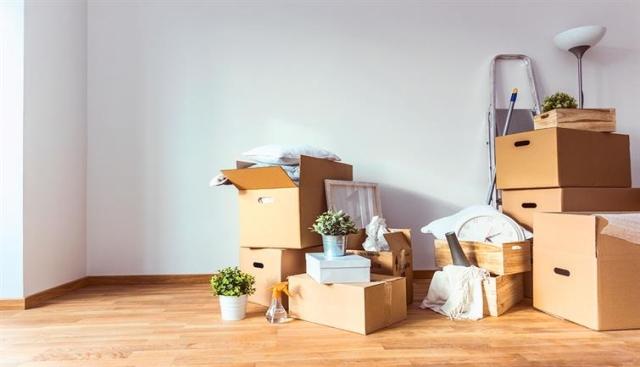Whether you’re moving out of your childhood home for college, a new job, or just to get out on your own, you want to be prepared! Making that leap and beginning this new stage of life can be a bit intimidating – but with the right prep work, you’ll be ready to roll when the time comes.
How to Move Out for the First Time
If you want to make this easier on yourself, creating a moving-out checklist is a surefire way to determine the necessary steps for your first move. Divide up your moving checklist into sections, preferably by the stages of your move: budgeting, packing, and moving. Add steps to each stage to ensure that you cover all of your bases (or just continue reading and I’ve done it for you – magical, I know). Though you may be antsy to get up and on with your life, you can’t do it overnight (or you shouldn’t).
Step One: Budgeting for the Move
Not everyone is a planner like myself, but when it comes to moving out for the first time, you really need to dedicate your attention to the prep work. Can you afford to live on your own? If you (or whoever is paying your rent) doesn’t make three times the rent (a general rule of thumb), then this whole “moving out” thing may not be in your near future. Make sure to check off these preparation and budgeting boxes before your first move:
- Maintain a stable income. Do you have a steady job or a stable income? You better! Whether your parents are paying for your college apartment or you’re all on your own, you need to have a reliable income. It’s vital that you budget for your first apartment to be absolutely sure that you can afford to live on your own. Don’t be like one of the many, many twenty-somethings who become “rent poor” after a few months of being out on their own. You can do this! You just need to budget wisely.
- Save as much as you can. Yes, a portion of your income will be going towards rent (a bigger portion than you’re probably expecting). How much you spend on rent depends on your income, but generally, you shouldn’t spend more than 30% of your take-home pay on rent. But because that portion of your income will immediately go to rent, you need to save up so you have a bit of wiggle room and don’t have to go a few weeks eating only buy-one-get-one canned goods (been there, done that). It’s best to save for a few months ahead of your move just to be safe.
- Consider moving costs. Though it would be nice if you could move entirely on your own, that likely won’t be the case. Whether you have family, friends, or a professional moving service helping you to move into your first apartment, it’s nice to have a helping hand! But don’t forget about moving costs. Though your family and friends may be fine being rewarded with a few pizzas after moving day, I highly doubt your professional moving company will feel the same. It’s going to cost you, so do your research to figure out a local estimate for the time and place you’re looking to move.
- Find an apartment that meets your needs first, followed by your wants. It all comes back to your budget here, renters. First and foremost, find an apartment that meets your budget (which is a must) before it meets your desires, such as a swimming pool, a 24-hour fitness center, and an on-site dog park. Those are all great amenities, but you have to make sure that an apartment won’t cost you more than 30% of your income before you can pick and choose amenities.
Step Two: Packing for the Move
Though packing may not sound like your ideal afternoon activity, it’s a necessary step to the move – not only packing, but packing well! Check off these boxes to keep yourself from throwing everything you own into a few boxes and trash bags and “figuring it out when you get there.” Let’s avoid the chaos, shall we?
- Don’t procrastinate. Coming from the world’s biggest procrastinator, try not to follow in my footsteps. Procrastinating the packing will only hurt you and annoy your moving helpers.
- Get as many boxes and moving bins as possible. You can get free moving boxes from numerous locations such as grocery stores, delivery service providers (FedEx or UPS), or other local businesses around your area. Many of these places get their shipments in large boxes perfect for moving, and since they recycle them, they’ll be more than happy to give them to you for free. Moving bins are very handy, especially for kitchen items such as plates and glasses.
- Organize your belongings by room and label your boxes. There’s nothing worse than unpacking on moving day just to remember that you threw everything into random boxes with no thought process behind it. This creates my least favorite thing – stress! Make the move easy on yourself – organize your belongings by room, place them in the correct boxes and bins, and label everything.
- Set up a moving truck and a storage locker. It’s likely you’ll need a moving truck on moving day, so look up the cost ahead of time, and choose a day and time for movers to arrive or to pick up the moving truck. It’ll be less costly to rent a moving van or trailer than it will be to hire a team of movers, but it just depends on how much help you need to move your items. And if everything won’t fit into your new apartment, look into renting out a storage locker to store your extra items!
Step Three: Moving Day
- Get an early start. A big mistake is underestimating how long it takes to move into an apartment. It’s time consuming, so the earlier the start, the better!
- Move in the big items first. Your couch, mattress, bedroom furniture, and kitchen table are all items that are considered “big.” Go ahead and get those pieces off of the moving truck and into the apartment – that way, you can get the heavy lifting over with and you can have a better idea of how your apartment will be laid out.
- Don’t unpack until you’ve moved everything in. After the big items go in, bring in all of your boxes and bins and put everything in the room or area of the apartment in which it will belong. For instance, if your box says “KITCHEN,” do not put it in your bedroom (you know who you are). And before you unpack anything, try to get everything out of the truck and into the apartment. One step at a time!
- Return the truck in a timely manner. Movers charge by the hour and moving trucks charge by the mile and amount of time rented, so it’s best to get things done as efficiently as possible. If you no longer need the truck, return it! And let your movers get everything out and into your new place in a timely fashion.
- Take a necessary lunch break. Yes, you want to get everything done so you can be done with this dreadful day, but don’t forget to break for lunch! It sounds silly, but it will give you and your helpers some time to unwind (and dry their sweat). Moving is exhausting, so it’s important to take a small break.
- Organize as you unpack. As you begin unpacking your boxes and bins, try to stay as organized as you were when you were packing them. Put things where you want them to be, rather than cluttering everything on your bed or the kitchen counters and “worrying about it later.” Later you doesn’t want to do it either, so better to just get it over with now. Put things in their designated drawers and cabinets, and call it a day.
Moving can be overwhelming – we know! But with the right tips, prep work, and maybe a helping hand or two (or three), your first move will fly by! Happy moving, my newbie renters.






